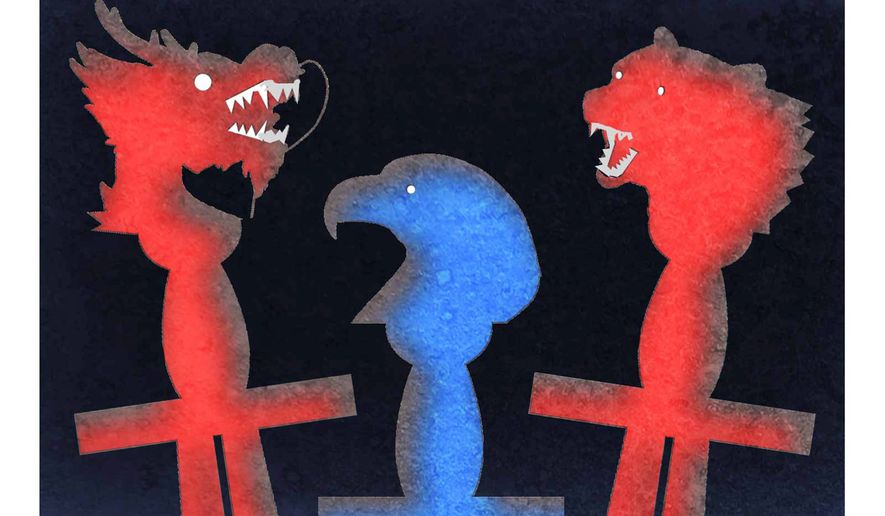OPINION:
On March 21, President Biden spoke to the CEOs of the Business Roundtable. He said that since 1946, “…we’ve established a liberal world order and that hadn’t happened in a long while. … And now’s the time when things are shifting … there’s going to be a new world order out there and we’ve got to lead it. And we’ve got to unite the rest of the free world in doing it.”
Mr. Biden is correct in stating that a new world order is emerging, but it has nothing to do with that which he envisions. With his assistance, the “new world order” is going to be dominated by Russia and China.
On Feb. 4, the opening day of China’s Winter Olympics, Russian President Vladimir Putin and Chinese President Xi Jinping announced a new strategic agreement between their nations which as they described it, has “no limits.” Each supported the other’s positions on Ukraine and Taiwan.
Early in his presidency, Mr. Biden forecast “extreme competition” with China, saying that America would stick to the “international rules of the road” to do it. You have to hand it to Mr. Biden. When he decides on a plan — like his plan for withdrawal from Afghanistan or his current plan to renew former president Obama’s 2015 nuclear weapons deal with Iran — he sticks with it regardless of how obviously his plan is failing.
The “international rules of the road” Mr. Biden referred to are key to the liberal idea of a “rules-based” international order. Mr. Putin and Mr. Xi are writing their own rules.
The current examples of Mr. Biden’s fealty to failure are in his plan to sanction Russia economically and in his plan to renegotiate the Iran deal with Russia controlling the negotiations.
At least since the advent of the Carter presidency in 1977, America has been engaged in the diplomacy of self-doubt with only a brief respite in the Reagan era. America — like our NATO allies — has been overcome by the idea that diplomacy — “soft power” — is always preferable to the “hard power” of military action.
Former President Barack Obama shrugged off Russia’s conquest and annexation of Crimea. Sanctions were imposed that had little or no effect on Russia. When Mr. Biden threatened sanctions against a Russian invasion of Ukraine, he failed to deter it with predictable results.
Mr. Putin’s invasion of Ukraine was the death knell of the so-called “rules-based order.” Mr. Putin has managed to split NATO into two factions: one which seeks to sanction Russia as a penalty for the Ukraine invasion and another, led by Germany and France, which seeks to appease Mr. Putin. That desire goes far deeper than those nations’ lack of support for sanctions.
NATO’s Article 5, which imposes on its members the duty of mutual defense, is now far less of a threat to Russia and China than it had been for the past 73 years. Estonia, Latvia or Lithuania may be next on Mr. Putin’s list for conquest, but many of NATO’s members are unable to act as Article 5 requires them to do.
Former President Donald Trump was right to mock the NATO nations for their failure to invest in their own defense in support of their commitments to NATO. After Russia commenced its invasion of Ukraine, Alfons Mais, commander of Germany’s army, said, “The Bundeswehr, the army I am allowed to lead, is more or less bare. The options we can offer the politicians to support the [NATO] alliance are extremely limited.” The armed forces of France, Italy and too many other NATO nations are in the same condition. Soft power, they fail to understand, is bound to fail unless it is supported by the threat of military power.
Germany’s sudden commitment to more military spending after Russia’s invasion of Ukraine will not last longer than it takes for either Ukraine or Russia to win the war. Though many American businesses have ended their operations in Russia, France’s government-supported carmaker, Renault, reportedly resumed production at its Moscow plant on March 21 after a brief shutdown.
France, Germany and Italy reportedly sold Russia arms ranging from firearms to tanks and rockets between 2015 and 2020 despite the sanctions against doing so. Those nations are thinking like shopkeepers, not like nations seeking to deter their — and our — enemies. In words attributed to Lenin, they were selling Russia the rope with which it can hang them.
Mr. Biden has been doing the same in enabling Russia’s negotiators to steer his negotiations with Iran to revive Mr. Obama’s 2015 nuclear weapons deal. He and the Iranians may soon reach a deal that is manifestly worse than the original.
The West continues to suffer from post-Cold War self-doubt. Neither Russia nor China has that disability.
We cannot lead any new world order while Russia makes war in Europe or while China threatens Taiwan and our Pacific allies. We could, with better strategic thinking and significant investment in modern weapon systems, restore the credibility of our deterrent.
Mr. Biden is neither capable of that sort of thinking nor of making such investments. If he were, he would realize that in order to lead any new world order NATO has to be reunified and our deterrent reinforced, to deny Mr. Putin’s and Mr. Xi’s abilities to threaten it.
• Jed Babbin is a national security and foreign affairs columnist for The Washington Times and contributing editor for The American Spectator.




Please read our comment policy before commenting.